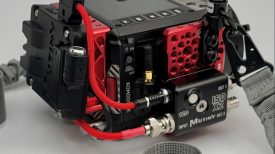At IBC 2019 I caught up with Florian Bloch from ARRI to talk about their new Orbiter lighting system.

As we have covered the light in quite a lot of detail already on the site I was interested to find out from Florian about how the Orbiter was developed, why it was important to make it a versatile fixture, and the challenges in combing software with hardware.

Florian told us that the Orbiter has been in development for quite a long time as ARRI was waiting for the technology to catch up to their concept. The actual LEDs being used in the Orbiter have been designed specifically for ARRI.

Orbiter’s top features are a variety of optics including open face, projection, dome, and light banks, ARRI Spectra six-color wide gamut light engine; extremely powerful output for maximal brightness and perfect colors; the Lighting Operating System (LiOS) with powerful software features; integrated color sensor for matching ambient light; weatherproof housing; a removable, intuitive control panel; perfect smooth dimming to zero; a full suite of connectors and sensors; and an internal power supply, wireless DMX, and battery input.

KEY FEATURES
- Variety of optics including: open face, projection, dome, and softboxes
- ARRI Spectra six-color, wide gamut light engine
- Extremely powerful output for maximal brightness and perfect colors
- Lighting Operating System (LiOS) with powerful software features
- Weatherproof housing
- Integrated color sensor for matching ambient light
- Removable, intuitive control panel
- Full suite of connectors and sensors
- Perfected smooth dimming to zero
- Internal power supply, wireless DMX, & battery input
Changeable optics

With a wide variety of optics to choose from, Orbiter transforms into the versatile light for your application without sacrificing beam, output, or color quality. The Quick Lighting Mount (QLM) in Orbiter allows for optics with vastly different properties to be attached to the fixture.

The high-output, directional beam of the open face optic is ideal for throwing light long distances. The high precision of the projection optics creates a perfect circle of light that can be shaped with cutters, focus, and gobos.

The dome optic provides omnidirectional, soft light, great for illuminating large spaces, and a universal QLM adapter creates a direct mounting point for Orbiter-specific Chimera and DoPchoice products. With versatility built-in.
The Orbiter is expected to start shipping early in 2020, and the price will be around $7,000 USD.
Like what we do and want to support Newsshooter? Consider becoming a Patreon supporter and help us to continue being the best source of news and reviews for professional tools for the independent filmmaker.







